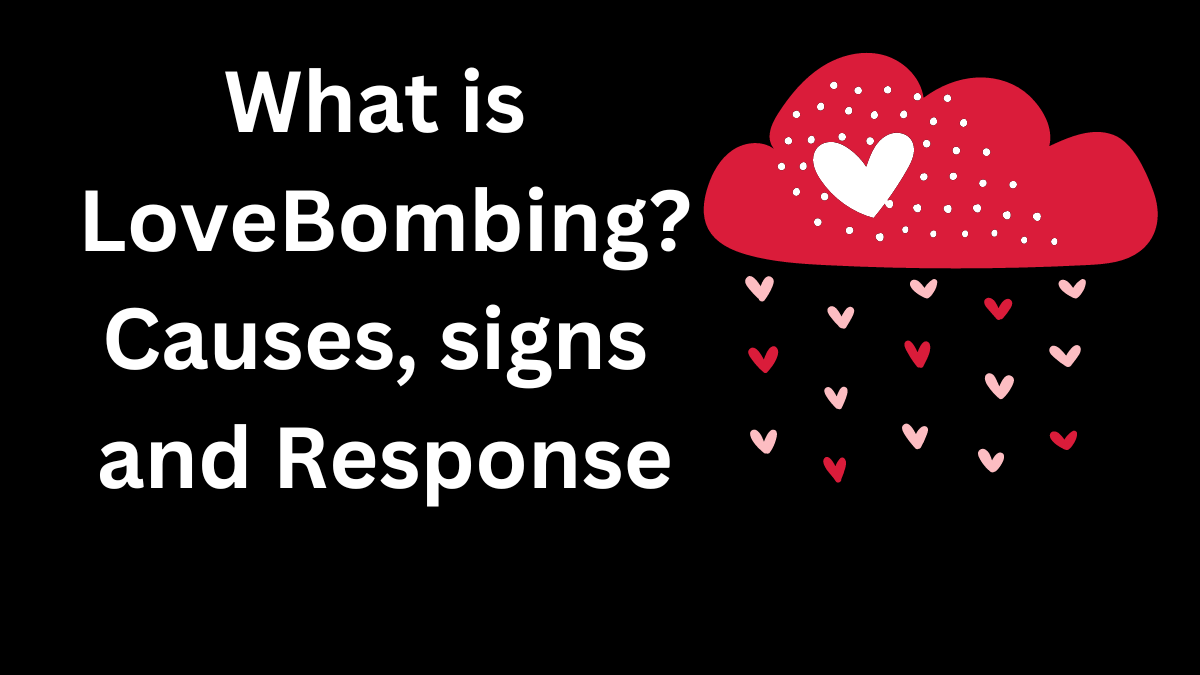Love bombing is how some people act too nice to control someone else. They shower their partner with lots of affection and praise. This tactic happened often in cults before. People also use it in relationships.
Love bombing became a popular term in the 1970s and 1980s. Researchers who studied cults and how groups manipulate people started using it then. Now, counselors use this term too when talking about abusive relationships where one person is controlling the other. In this blog post, we will discuss, what is love bombing? Causes of love bombing and how to deal with it.
What is Love bombing?
Love bombing is a manipulative tactic used by individuals to gain control and influence over their targets in relationships. This behavior involves overwhelming the target with excessive attention, affection, and grand gestures in the early stages of the relationship. Love bombers often shower their targets with compliments, gifts, and constant contact in an attempt to create a false sense of intimacy and connection.
Causes of Love bombing
Love bombing seems kind at first, but it hides a dark truth. Let’s uncover the driving forces behind this deception:
1. Insecurities and Narcissism
Those who love bomb often feel inadequate deep down, or crave constant praise. Overdoing affection masks their insecurities and need for validation.
2. Idealization and Projection
Early on, love bombers put their partner on a pedestal, projecting fantasies onto them. This fake intimacy lays the groundwork for manipulation later.
3. Control and Power Dynamics
Love bombing aims to gain control and power. By smothering with affection, love bombers influence emotions and actions, seeking relationship dominance.
4. Emotional Abuse and Manipulation
Behind the loving facade lurks emotional abuse. Love bombers exploit vulnerabilities through intense affection, maintaining their dominant position.
5. Cycle of Idealization and Devaluation
After showering love, love bombers suddenly withdraw attention, leaving partners confused and destabilized. This cycle traps victims in a web of manipulation.
The need to love bomb comes from hard issues inside people. They want power, to control how things go in love ties. Love bombing is not a kind act. It is a way to mess with others’ minds.
Recognize the signs of love bombing early on to avoid potential manipulation and maintain healthy boundaries in relationships.
Recognizing the Early Signs of Love Bombing
Here are some signs of love bombing:
1. Overwhelming affection
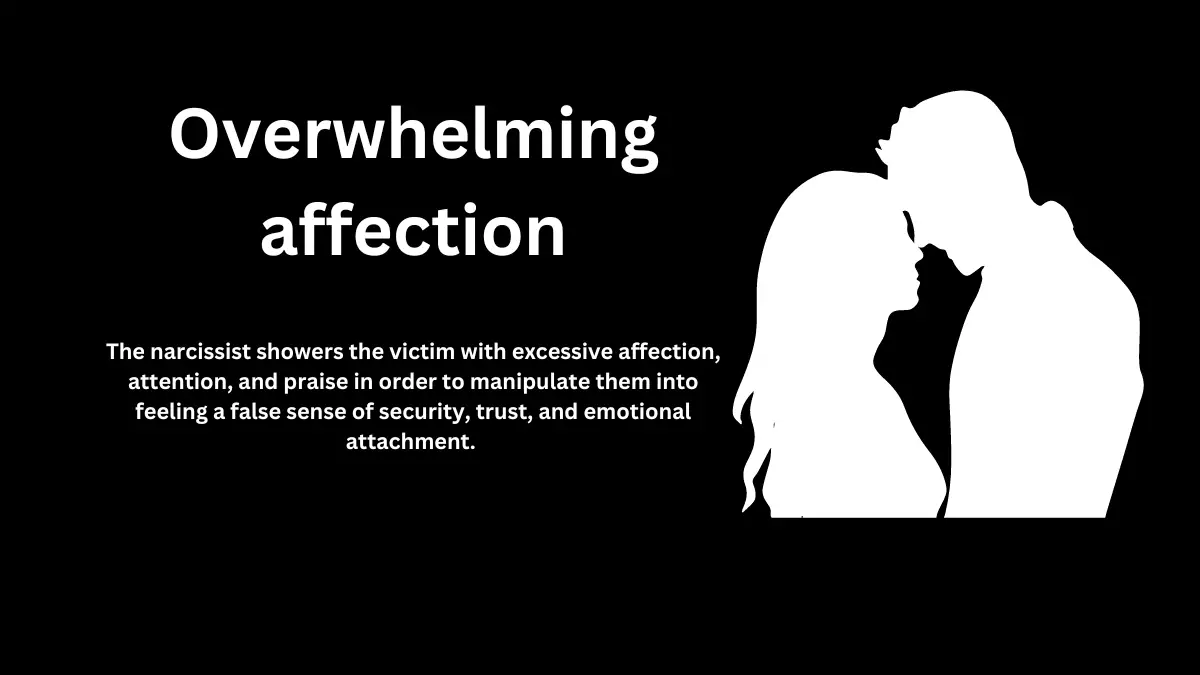
Overwhelming affection marks love bombing by a narcissist. The narcissist bombards the victim with excessive love, care, and praise. They manipulate, creating false security, trust, and emotional bond. Constant compliments, over-the-top loving gestures, intense suffocating focus on the victim – this excessive affection aims to make the victim dependent. Making it easier for the narcissist to control and exploit them later.
When the victim is emotionally invested, the narcissist may suddenly switch. Devaluation, criticism, abuse – a sharp contrast from before. This makes it very hard for the victim to leave the relationship.
2. Constant praise
The Narcissist constantly tells you how amazing, special, and perfect you are.
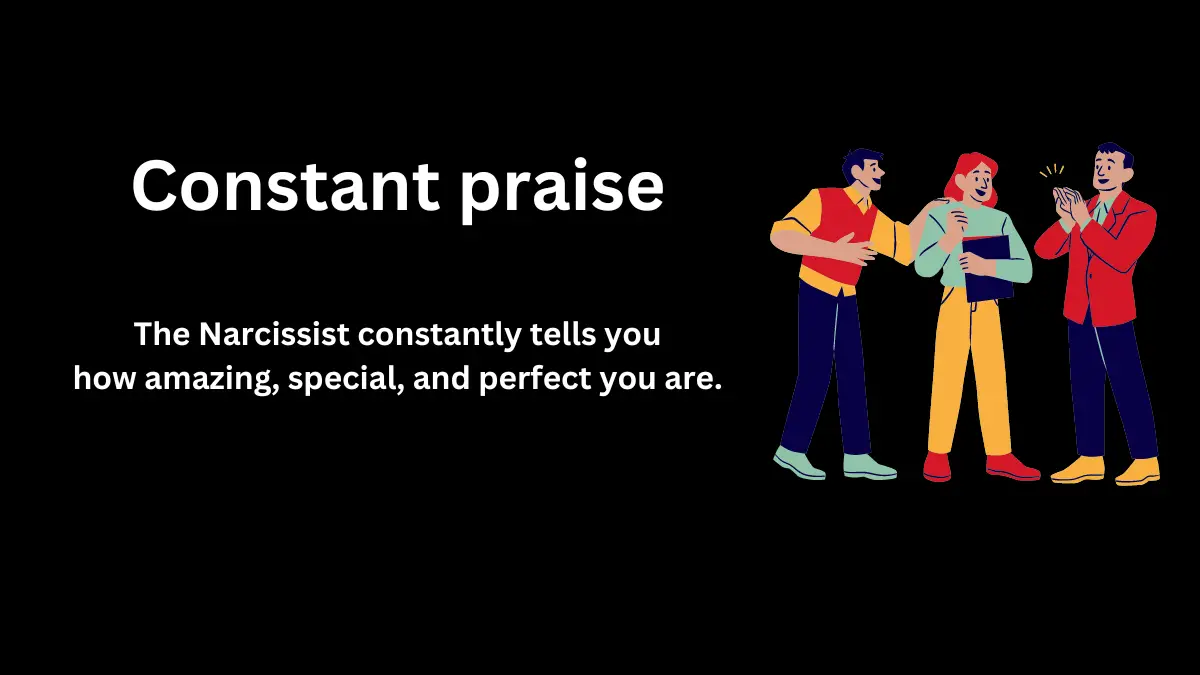
Narcissists often use constant praise as a tactic in a romantic relationship. They give too many compliments, making the victim feel special. This tactic is called love bombing.
The narcissist praises constantly to manipulate the victim. This creates a false sense of security and emotional attachment for the victim. However, the praise isn’t real admiration; it controls the victim.
3. Quick commitment
At a rapid rate, the Narcissist desires progression towards a closer bond. Time is insignificant, as the expectation for a shared future arises swiftly.
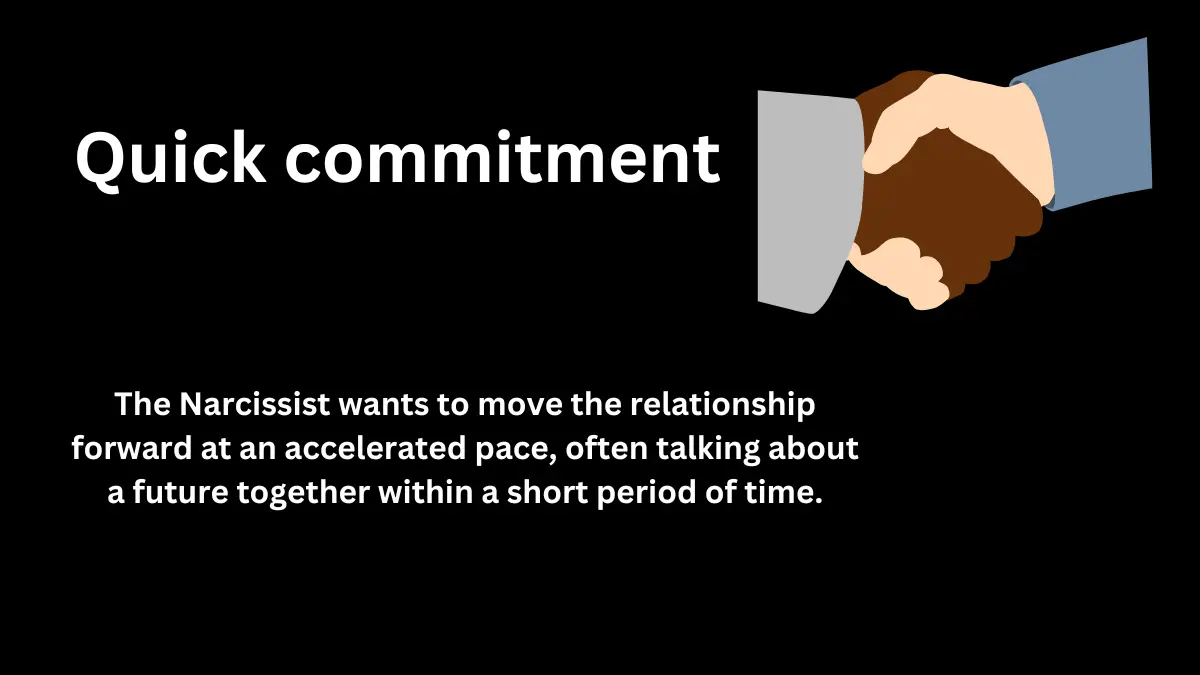
When you fall in love, things often move quickly. But sadly, speedy commitment is a red flag in relationships with narcissists. These manipulators rush the relationship forward by pressuring their victim into major moves — like moving in together or getting engaged — in a very short time period.
This rapid push isn’t romantic; it’s calculated to make you feel the relationship is meaningful and secure when that bonding is artificial. The narcissist hopes hurrying commitment deepens your emotional investment before you detect foul play.
The swiftness also isolates you by making outside input harder, trapping you through sunk costs. If you’ve combined living spaces or gotten engaged, leaving feels like surrender of major life sacrifices. You stay, hoping devotion justifies the gamble — enabling the narcissist’s ever-tightening control.
In time, swift commitment feels like a jail cell. The narcissist reveals their true, abusive colors as you’re stuck in an unhealthy, inescapable bond you never realized endangered your freedom.
4. Isolation
The Narcissist wants to spend all their time with you, and may encourage you to cut ties with friends and family.
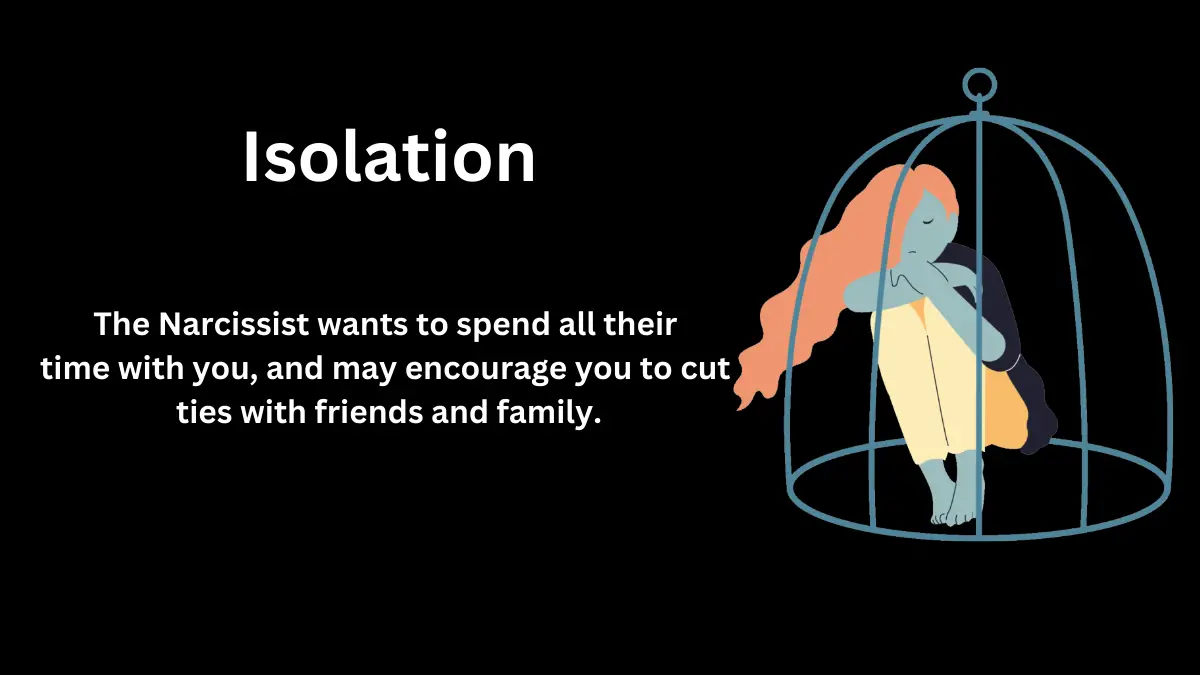
Isolation is a common method employed by narcissists in romantic relationships, used as part of love bombing tactics. The narcissist encourages cutting ties with friends, family, and support systems. So the victim spends all time with the narcissist, entirely dependent on them.
Firstly, this makes the victim reliant on the narcissist for emotional validation and support. Secondly, it limits outside perspectives and support access, making manipulation and abuse harder to recognize. Thirdly, it allows easier control and manipulation, with fewer challengers or questioners in the victim’s life.
While believing they’re building a special connection, the victim gradually feels loneliness, helplessness, and turmoil from the isolation. It also makes leaving the relationship or seeking help increasingly difficult when abuse worsens.
5. Jealousy
The Narcissist becomes extremely jealous and possessive, trying to control your every move.
Narcissists use jealousy as a tactic to love bomb their partners. They become extremely possessive, controlling every move and limiting outside connections. Jealousy seems caring at first, but quickly becomes oppressive.
The goal is making their partner feel most important, creating dependence. The victim fears triggering jealousy, making it harder to leave or seek help.
The narcissist uses jealousy to manipulate emotionally. They make the victim feel guilty, responsible, ashamed for their actions. The victim walks on eggshells.
Jealousy traps the victim in the relationship, unable to escape the narcissist’s control.
6. Excessive gifts
The Narcissist gives you excessive gifts, often in an attempt to buy your affection.
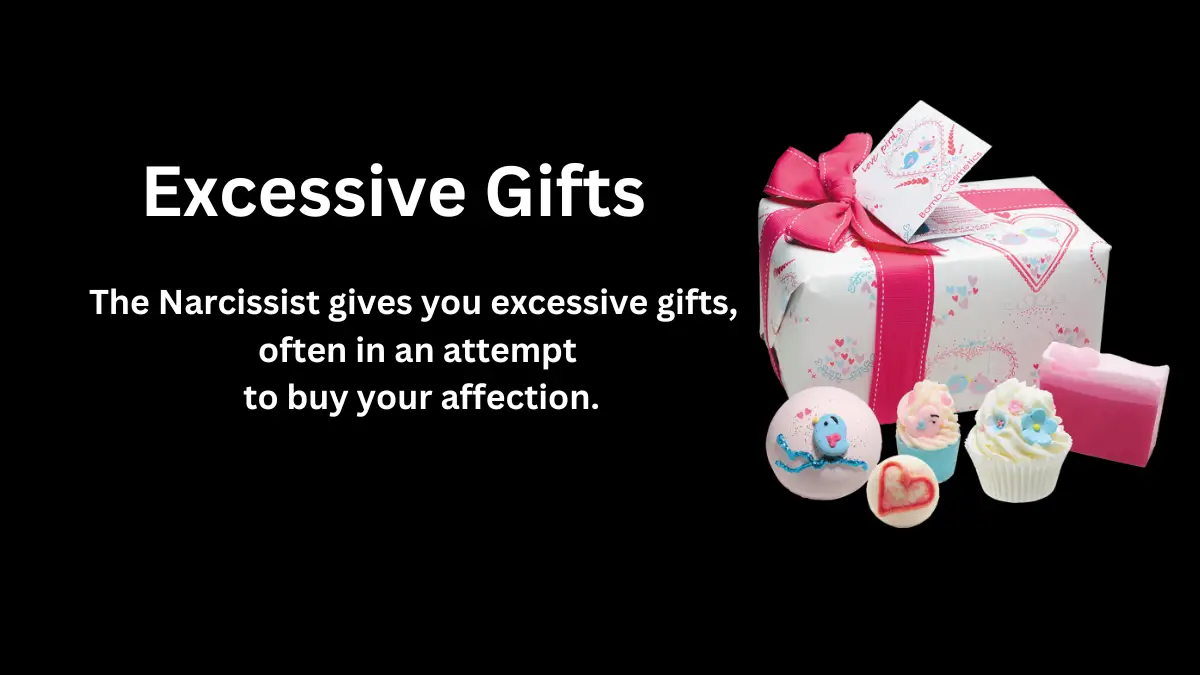
Often, a narcissist uses excessive gifts to love bomb a romantic partner. Out of nowhere, the narcissist showers the victim with pricey or thoughtful presents. It’s a way to gain the victim’s affection and trust. Jewelry, clothes, vacations, or lavish items come as gifts. Designed to make the victim feel special, appreciated.
The excessive gifts create a false sense of security and attachment between victim and narcissist. The victim may think they’re in a fairy tale relationship. They may start relying on gifts for validation, self-worth. However, the gifts become less frequent or turn to criticism, devaluation. The victim feels confused, unsure about the relationship.
Sometimes, gifts control the victim. The narcissist expects gratitude, obedience in return. This makes leaving or seeking help harder for the victim. They may feel guilty, indebted to the narcissist.
7. Intensity
The Narcissist’s affection and attention are intense and all-consuming, leaving little room for anything else in your life.
Love bombing is a narcissist’s strategy in relationships. Intense emotions alternate rapidly between affection and coldness. The highs feel elating but the lows leave victims distressed. This rollercoaster aims to foster dependency on the narcissist. Victims become unable to evaluate the relationship objectively.
The highs and lows become addictive, making victims feel incomplete without the narcissist. Gradually, this intensity turns abusive, allowing manipulation and exploitation. The narcissist may become obsessive, jealous, or even dangerous. Victims feel trapped, unable to leave due to fear, guilt, or obligation.
The relationship’s intensity erodes the victim’s sense of self, causing confusion, anxiety, and depression. Highs and lows create an overwhelming emotional dependency on the narcissist. The goal is to keep victims off-balance, unable to think critically about the situation.
8. Disregard for boundaries
The Narcissist disregards your boundaries and does not respect your personal space.
Disregard for boundaries is a common tactic used in love bombing by a narcissist in a romantic relationship. The narcissist may ignore or dismiss the victim’s personal boundaries, and may insist on being involved in every aspect of the victim’s life.
This can include intrusive behaviors such as checking the victim’s phone or email, demanding to know their whereabouts at all times, or controlling their relationships with friends and family.
The goal of disregarding boundaries is to gain control and power over the victim, and to make the victim feel like they are completely dependent on the narcissist.
The victim may feel like they have to constantly compromise their own values, needs, and desires in order to please the narcissist, which can lead to feelings of self-doubt and loss of identity. Over time, the disregard for boundaries may become abusive, with the narcissist using it to manipulate, control, and exploit the victim.
In some cases, the disregard for boundaries may escalate to the point of abuse, with the narcissist using physical, emotional, or psychological means to control the victim. The victim may feel trapped in the relationship, unable to leave or seek outside help due to fear, guilt, or a sense of obligation.
Disregard for boundaries can also make it difficult for the victim to maintain healthy relationships with others, leading to feelings of isolation and loneliness.
9. Emotional manipulation
The Narcissist uses emotional manipulation to control your thoughts, feelings, and actions.
Narcissists frequently employ emotional manipulation in romantic relationships involving love bombing tactics. They may guilt-trip, gaslight, or play victim to control the victim’s feelings.
Making victims feel responsible for narcissists’ happiness, blaming them for problems, or convincing them their perceptions/feelings are wrong are common tactics. The manipulator’s aim is gaining power/control over victims, making them emotionally dependent.
Victims often walk on eggshells, excuse narcissistic behavior to preserve the relationship, leading to self-doubt, anxiety, depression. The emotional manipulation can become abusive over time, with narcissists exploiting, controlling victims.
Examples of love bombing
Here are five examples of love bombing:
- Purchasing costly presents without an occasion.
- Texting or emailing repeatedly throughout the day.
- Praising the individual excessively with compliments.
- Planning romantic surprises like vacations unexpectedly.
- Doing favors out of one’s way for that person.
How long does love bombing last?
Love bombing in a relationship with a narcissist lasts until the victim recognizes the manipulation and confronts them. At that point, the narcissist may either continue love bombing to regain control, or use different tactics like devaluation or gaslighting to maintain control.
Love bombing may last a short time, like weeks or months. Or, it could go on for years if the victim deeply invests in the relationship and can’t recognize the manipulation. Ultimately, how long love bombing lasts depends on factors like the relationship nature, the victim’s self-awareness, and the narcissist’s tactics used.
The duration of love bombing by a narcissist partner varies. But it usually continues until you see through their tricks and challenge their behavior. Then, they might keep love bombing, trying to regain power over you. Or, they could switch tactics, like devaluing or gaslighting you, to stay in control. Sometimes, love bombing is brief—just a couple weeks or months.
Yet other times it drags on for years, especially if you’re really committed to the relationship and blind to their games. At the end of the day, how long the love bombing phase lasts comes down to things like the relationship dynamics, your level of insight, and the narcissist’s manipulation strategies.
Narcissists love bomb for different lengths of time in relationships. It may be short-lived, lasting mere weeks or months before the victim catches on and confronts the manipulation. Other times, it persists for years if the victim remains deeply invested and unable to identify the deceit.
When challenged, narcissists either double down on love bombing to regain dominance, or pivot to new control methods like devaluation and gaslighting. Factors influencing duration include relationship nuances, victim self-awareness, and narcissist’s preferred manipulation tactics.
It is important to seek help and support if you are experiencing love bombing in a relationship, as it can have a significant impact on your emotional well-being and sense of self.
Difference between natural love and love bombing
Natural love and love bombing are two very different experiences in a relationship.
Natural love is having tender and kind feelings that grow over time. As they know each other better and create a relationship, two people feel affection. There’s mutual understanding, respect, and caring. It has trust, honesty, and being open.
Natural love builds gradually. It’s emotionally intimate but balanced and reciprocal.
Love bombing is intense, overwhelming affection to manipulate and control someone. A narcissistic or sociopathic person uses it to quickly bond emotionally. This makes the victim dependent on the relationship.
Love bombing is lopsided. The victim gets smothered in attention and affection. But the narcissist stays emotionally detached and in charge.
Simply put, natural love connects two people genuinely. Love bombing exploits and controls the victim through a fake, one-sided bond.
Why Love Bombing is so dangerous?
Love bombing is bad because it makes things seem real that aren’t. It forms a strong bond fast. But this bond could allow control and hurt. It finds weaknesses so the person is easier to control.
Love bombing may feel great at first since it’s very intense and promising.
Yet, you may grow close to someone whose values or plans aren’t good. The controlling partner might use your weaknesses against you, keeping you in a lopsided relationship.
How to heal after being love bombed?
After being love bombed, people must heal and set boundaries. Regaining power and trust is crucial. Recovering from love bombing’s emotional wounds needs self-reflection, self-care, and support from trustworthy people or professionals. Here are some steps you can take to heal after love bombing:
Drawing Lines and Standing Firm
Rebuilding after love bombing demands setting strong limits and staying true to yourself in relationships. Setting healthy boundaries puts you in control of your emotional well-being and protects against manipulative tactics. Follow these tips to draw lines firmly yet kindly:
1. Know Your Values and Needs
Figure out what you value and need in a relationship. Single out your non-negotiables and top priorities. Reflect on the values, dreams, and dynamics that make you feel respected and supported. Clarifying your needs empowers clear communication.
2. Speak Openly and Honestly
Express boundaries and needs assertively yet respectfully. Use straightforward “I” statements to convey how you feel without blaming. Like, “I feel uncomfortable when personal space is invaded,” not “You always invade my space.”
3. Listen to Your Gut
Trust your instincts if something feels off or inconsistent. Love bombers often use charm and grand gestures to manipulate. If words and actions don’t align or things don’t feel genuine, trust your gut.
4. Set Clear Boundaries
Have guidelines that fit your values and requirements. Define specifically acceptable and not okay actions in connections. Tell your partner, buddies, or family these rules and uphold reliably. Be set to take action if someone crosses your lines often.
Care for yourself as you maintain limits and speak up. Do things that make you happy, decrease stress, and improve wellness overall. Take time just for you to recharge and think. Taking care of yourself builds self-worth and empowers healthy boundaries.
Self-Care and Self-Reflection
After experiencing the trauma of love bombing, caring for yourself and reflecting inwardly become vital tools for healing and rebuilding self-trust. These practices help regain emotional control, foster self-awareness, and nurture overall well-being. Here are practical tips to incorporate self-care and self-reflection into your recovery journey:
1. Prioritize Your Needs
Make self-care a must in your life. Identify your personal needs and ensure they’re met. Set boundaries. Say no when needed. Create time for joyful, relaxing activities.
2. Focus on Emotional Healing
Process your emotions healthily. Journal, attend therapy, or confide in a trusted friend. Healing takes time – be gentle with yourself during this process.
3. Nurture Your Physical Well-being
Care for your body to support emotional healing. Exercise regularly. Maintain a balanced, nourishing diet. Prioritize consistent sleep. These practices positively impact mental health and resilience.
4. Practice Mindfulness and Meditation
Cultivate mindfulness. Embrace the present moment. Engage in meditation or mindfulness exercises to calm the mind, reduce stress, and promote self-awareness. Start with short sessions, gradually increasing as you become more comfortable.
5. Engage in Creative Outlets
Discover creative outlets that resonate with you. Whether it’s painting, playing an instrument, writing poetry, or dancing, tapping into your creativity provides an opportunity for self-expression, emotional release, and personal growth.
6. Seek Support from a Therapist or Support Group
Consider seeking professional help from a therapist who specializes in relationship trauma and recovery. A trained therapist can provide guidance, validate your experiences, and help you navigate the healing process. Joining a support group can also create a sense of community and understanding.
7. Practice Self-Reflection
Engaging in self-reflection exercises can deepen your understanding of yourself and your needs. Set aside regular time for introspection, journaling, or exploring guided self-reflection prompts. Reflect on your boundaries, values, and long-term goals to regain a sense of self-empowerment.
Remember, self-care and self-reflection are ongoing practices.
Be patient with yourself as you navigate your healing journey. By nurturing your emotional well-being and prioritizing self-care, you can regain your power, rebuild trust in yourself, and embark on a path towards better mental health.’
“Self-care is not selfish or indulgent. It’s essential for our overall well-being and healing.” –
Unknown
FAQS on Love Bombing
What is love bombing?
Love bombing employs excessive flattery and affection, manipulating emotions to control victims. It’s a dishonest tactic that exploits vulnerabilities, establishing power dynamics. The perpetrator showers someone with overwhelming attention, creating intense emotional bonds for personal gain.
How can I recognize love bombing?
Watch for these telltale signs: Extreme focus and compliments right away. Constant communication and demands for closeness too fast. They act perfect, making grandiose promises that seem unrealistic. An urgent need to forge deep emotional ties from the start.
What are the effects of love bombing?
Victims become addicted to the constant praise, struggling to escape toxic bonds. Self-doubt, anxiety, and dependency develop. Long-term impacts erode self-esteem and trust. Future healthy relationships suffer from love bombing trauma.
How can I protect myself from love bombing?
et firm boundaries. Seek gradual trust-building, not instant intensity. Listen to your instincts – don’t ignore red flags. Value self-respect over manipulative flattery. Foster positive self-esteem and healthy communication patterns. Prioritize mutually caring partnerships over controlling behavior.
Should I seek professional help for recovery?
Seeking help from experts can aid recovery after love bombing. A counselor provides emotional backing, guidance, and support navigating the healing process. They can assist rebuilding trust, processing feelings, and developing healthy coping strategies. Therapy empowers establishing clear boundaries, identifying lingering effects, and regaining emotional control.
How can I differentiate love bombing from the honeymoon phase?
Healthy relationships have a honeymoon phase with mutual affection, excitement, and genuine connection. Love bombing is manipulative and short-lived. Both involve increased attention and compliments, but love bombing excessively controls. The key difference is manipulative intent behind love bombing, not developing trust and respect. The honeymoon phase gradually builds trust, while love bombing exploits vulnerabilities for power.
How can I prevent future incidents of love bombing?
Preventing future love bombing requires self-awareness and healthy practices. Set clear boundaries, communicate needs and expectations early. Note manipulation tactics or warning signs in new relationships. Practice self-care and self-reflection to build confidence and self-trust. Surround yourself with a supportive network who have your best interests. Remember healthy relationships are based on equality, mutual respect, communication, and no manipulation.
What should I do if I suspect someone is love bombing me?
Trust your gut if you suspect love bombing. Step back from the relationship to evaluate it objectively. Look out for manipulative patterns, lots of unnecessary attention and over-the-top gestures. Consider consulting a close friend or therapist for advice. Establish clear boundaries and enforce them. If needed, distance yourself from that person and prioritize your well-being. Your emotional and mental health come first.
How long does love bombing typically last?
Love bombing doesn’t last long – usually just weeks or months. During that short but intense time, the love bomber will use extreme charm and affection. They do this to create an emotional bond and gain control over you. Once they’ve achieved their manipulative objectives or feel in control, the excessive love bombing behavior often stops. This reveals their true intentions.
Can love bombing lead to ghosting?
Love bombing can sometimes result in ghosting, where all communication is suddenly cut off without warning or explanation. After the love bombing phase, the manipulator may simply lose interest or move onto a new target, leaving you confused and hurt. Ghosting cruelly maintains control and power over the victim, adding further emotional trauma on top of the love bombing.
Last words
Love bombing is an abusive tactic. It aims to overwhelm you with flattery, gifts, and affection. This makes you feel like you cannot leave. Narcissists and cult leaders often use this to control people. If someone is doing this, they don’t really care about you.
If you think this is happening to you, get help. Talk to someone you trust about your situation. A counselor can guide you. If needed, you can also get a legal order to keep that person away from you. Remember – true love does not come with manipulation or control.
Sources
- American Psychiatric Association. (2013). Diagnostic and statistical manual of mental disorders (5th ed.). Arlington, VA: American Psychiatric Association.
- Bergemeester A. (2022). Personal interview.
- Dynamics of abuse. (n.d.).
ncadv.org/dynamics-of-abuse - Simonian E. (2022). Personal interview.
- Strutzenberg CC, et al. (2017). Love-bombing: A narcissistic approach to relationship formation.
scholarworks.uark.edu/cgi/viewcontent.cgi?article=1013&context=discoverymag
